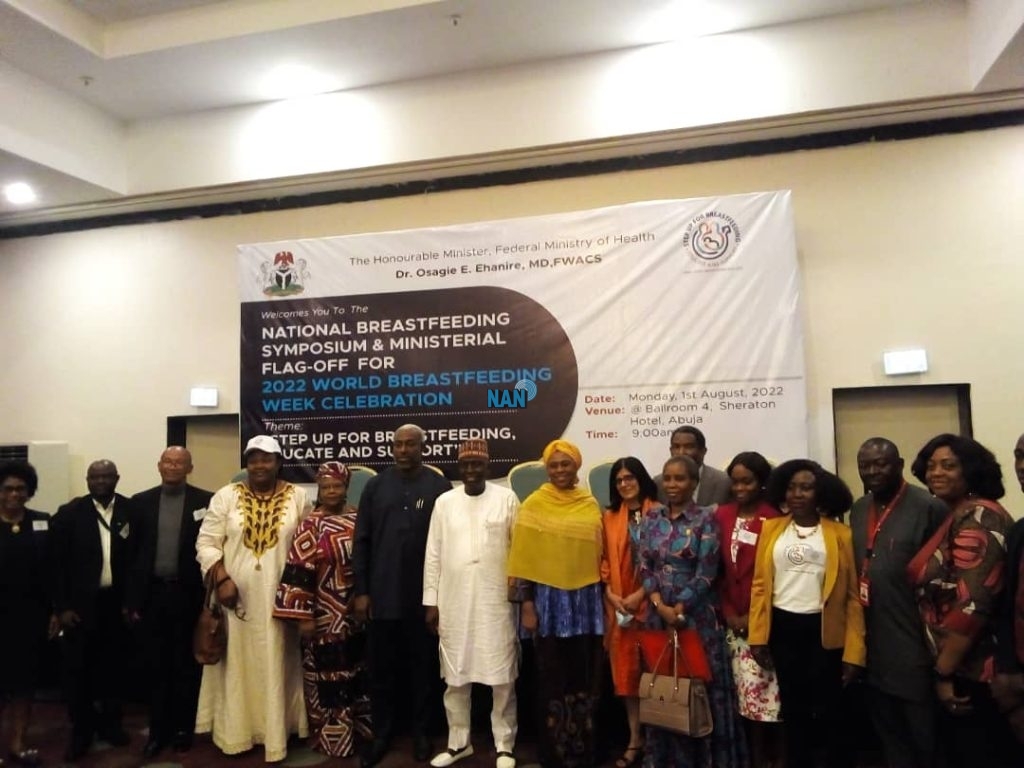The Minister of Health, Dr Osagie Ehanire, says the Federal Government is targeting an increase of 50 per cent in the rate of exclusive breastfeeding before the 2025 World Health Assembly.
He disclosed this during the ministerial launch of the 2022 World Breastfeeding Week (WBW) in Abuja on Monday.
He was represented by Mr Joseph Ekumankama, the Minister of State for Health, where he reiterated the ministry’s commitment toward cost-effective means to eradicate malnutrition.
He said “our aim is to achieve the 2025 World Health Assembly target of raising the rate of exclusive breastfeeding to at least 50 per cent.
“We recommend early initiation of breastfeeding within one hour of birth, exclusive breastfeeding for the first six months of life, continued breastfeeding up to two years of age or beyond, introduction of nutritionally-adequate and safe complementary foods from six months.”
The minister, therefore, reiterated government’s commitment to training of health professionals with information to cascade to mothers on the benefits of breastfeeding.
He added that “health professionals play critical roles in supporting women to breastfeed, and to do this effectively, they need appropriate knowledge — such as knowledge of the health outcomes associated with different methods of infant feeding.
“They also need knowledge on the physiological process of lactation, as well as positive, non-judgmental attitude and effective communication and practical support skills.”
Sen. Ibrahim Oloreigbe, the Chairman, Senate Committee on Health, said there was need to provide an enabling environment in work places both in formal and informal sectors to promote breastfeeding.
Oloriegbe, while advocating for the passage of law and implementation of six months maternity leave for mothers, said “we need to double our work, I wouldn’t know why it is delayed, we need to see it done.
“It is one thing to have a law and it is another thing to implement it.
“And unless we have enforcement and supportive system mechanism, we will not be able to have exclusive breastfeeding at the level we want it.’’
The Minister of Women Affairs, Mrs Pauline Tallen, said the 2022 theme of the WBW — “Step Up for Breastfeeding: Educate and Support” is aimed at educating the public on necessary knowledge, attitude and skills to support breastfeeding women.
Tallen, who was represented by Mrs Christine Oliko, Deputy Director, Women Development, called for the need to strengthen, protect,
promote and support breastfeeding for the survival, health, growth and development of the child.
Similarly, Dr Victor Ogbodo, the Programme Director, Nigeria Alive & Thrive, an NGO, said the group would incorporate the recommendations into its capacity development initiatives to improve maternal, adolescent, infant and young children nutrition in some states.
He said “the rate of exclusive breastfeeding in Nigeria was 17 per cent in 2018, increased to 29 per cent by 2021, according to national surveys.
“But that is still far short of the 50 per cent target by 2025 set by the World Health Assembly.
“We have made significant progress in recent years but we can and must do more.’’
Also, Dr Victor Ajieroh of Bill and Melinda Gates Foundation, said the foundation had commenced implementation of the Accelerating Scale of Maternal, Infant, and Young Child Nutrition (ASMIYCN) project in Kaduna, Kano, Sokoto, Borno, Bauchi, Yobe and Lagos states.
He, therefore, urged stakeholders to implement the Revised National Guidelines on the Baby Friendly Initiative to accelerate child
survival and reduce infant mortality.
The News Agency of Nigeria (NAN) reports that WBW aims to highlight the benefits of breastfeeding to the health and welfare of babies and to maternal health, focusing on good nutrition, poverty reduction and food security.
NAN also reports that WBW started with a declaration to encourage breastfeeding and improve infant health around the world
in August 1990 by government policymakers, WHO, UNICEF and other stakeholders.
In 1991, the World Alliance for Breastfeeding Action (WABA) was formed to act on the 1990 Declaration, and as part of the action plan, WABA introduced the concept of a globally integrated breastfeeding strategy, and later, the idea of celebrating it for one day turned into a week and came to be known as WBW.
The first WBW was celebrated in 1992. Now, it is celebrated in more than 100 countries across the globe.
The theme for this year’s celebration is “Step up for Breastfeeding: Educate and Support”, focusing on strengthening the capacity of actors in the protection, promotion and support of breastfeeding across different levels of society.

